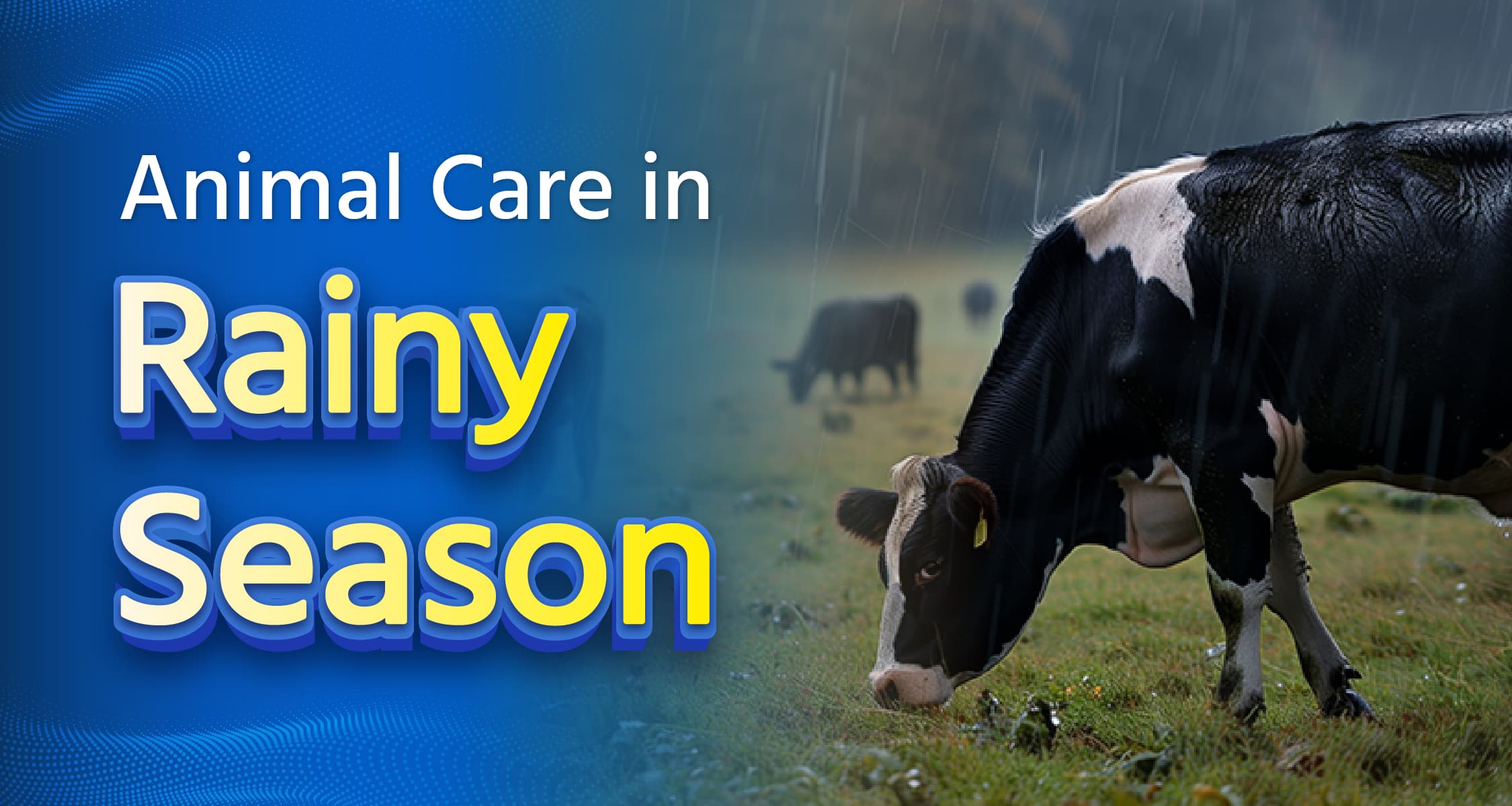Animal Care in Rainy Season

Proper care and attention should be given to animals throughout all seasons, but special care is needed for animals during the rainy season. During this season, animals are more susceptible to diseases. Their health can deteriorate and milk production capacity can also be adversely hampered, which can cause financial losses to the livestock owners. Here in this post, we will go through various information related to animal care during the rainy season in detail.
How does the Rainy/Monsoon Season Affect Animals?
- In some regions during the monsoon, animals face significant challenges due to heavy rainfall, floods, and landslides.
- Heavy rainfall and waterlogging in fields can destroy crops, leading to quality fodder shortages for animals.
- The increased humidity during this season can cause skin diseases and infections among animals.
- The population and occurrence of various insects and pests around animal habitats increase during the rainy season, affecting animal health.
- In this season, the possibility of foot and mouth disease in animals increases.
- Additionally, animals' immune resistance may decrease during the monsoon.
Animal Care in Rainy/Monsoon Season
- Housing for Animals: Do not keep animals in waterlogged areas during the monsoon. Keep them in dry places to maintain their health. Close doors and use thick mesh on windows to prevent rainwater from entering animal shelters.
- Cleanliness: Pay attention to the cleanliness of animal shelters along with the animals. Bathe the animals regularly with clean water. Clean the floor and walls of animal shelters once a week with phenyl or any other disinfectant.
- Animal Feed: Do not feed animals leftover fodder from the previous night the next day, as it can lead to various diseases. Provide fresh and balanced food for optimal animal health.
- Clean Water Supply: During the monsoon, water sources can become contaminated with mud and debris. Ensure that animals always have access to clean drinking water.
- Control of Parasitic Insects: During this season, the infestation of pests like ticks tends to increase. Therefore, bathe the animals regularly and use necessary insecticides if required.
- Use of Deworming Medicine: Administer deworming medicine to animals to eliminate internal parasites. Both young and adult animals should undergo deworming.
- Care of Sick Animals: Keep animals affected by diseases separate from healthy animals and ensure they have separate feeding and drinking arrangements. Take sick animals to a veterinarian as required.
- Changes in Fodder: In hot weather, there is often a shortage of green fodder. In such cases, animal caretakers increase the amount of dry fodder in their diet. Conversely, during the rainy season, abundant green grass and fodder are available, and animal caretakers suddenly switch to feeding green fodder to their animals. This sudden change can lead to digestion-related issues and diarrhea. To avoid this problem, do not make sudden changes in the diet. Gradually increase the amount of green fodder in their diet.
Susceptible Diseases in Rainy/Monsoon Season
- Foot and Mouth Disease (FMD): This is a highly contagious disease affecting hoofed animals such as cattle and buffaloes. Affected animals develop lesions in their mouths and on their feet.
- Anthrax: This is a bacterial disease that affects both animals and humans. Symptoms include fever, swelling, and difficulty in breathing.
- Black Quarter: This is a bacterial disease that affects cattle, buffaloes, and sheep. Animals affected by this disease may experience fever, swelling, and muscle stiffness.
- Ticks and Mites: During the rainy season, infestations of parasites like ticks and mites increase. These parasites live on the skin of animals, feeding on their blood, which can make animals weak and restless.
What do you do to take care of animals in the rainy/monsoon season? Share your answers and experiences with us in the comments. For more information related to animal health and nutrition, follow the 'Pashu Gyan' channel now. Also, don't forget to like and share this post to spread the information to as many farmers and livestock owners as possible.
Frequently Asked Questions (FAQs)
Q: How should we take care of animals?
A: During rainy weather, animals should be provided with proper food, water, shelter, and medical care. They should be kept in clean conditions to prevent the spread of diseases. Regular veterinary check-ups are necessary to ensure their optimal health. Additionally, animals should not be given spoiled food or contaminated water.
Q: How to take care of buffaloes?
A: For buffalo care, providing a balanced diet including grass, grains, and freshwater is crucial. They should be kept in a clean and dry shelter that protects them from extreme weather conditions. Regular bathing and hoof cleaning are necessary to maintain their cleanliness and prevent infections. Additionally, regular veterinary check-ups are important to ensure their health and prevent any potential diseases.
Q: How do animals protect themselves from rain?
A: Animals protect themselves from rain in different ways. Some animals, like birds, have water-repellent feathers that shed water and keep them dry. Animals like cows and buffaloes have thick skin and fur that provide insulation and keep them warm and dry. Some animals, such as squirrels and monkeys, seek shelter under trees, caves, or burrows to avoid getting wet.
Please login to continue

Get free advice from a crop doctor
